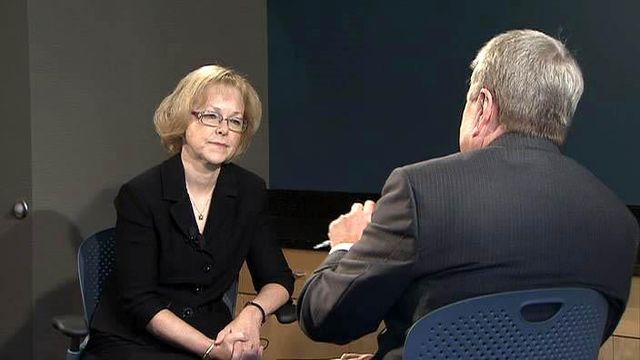Wos: Medicaid reform to be tailored for NC
In an exclusive interview with WRAL News, Secretary of Health and Human Services Aldona Wos also placed some of the blame for the troubled launches of two computer systems at the feet of counties and the media and defended hiring and compensation decisions that have been widely criticized in recent months.
Posted — UpdatedIn an exclusive interview with WRAL News, Wos also placed some of the blame for the troubled launches of two computer systems at the feet of counties and the media, and she defended hiring and compensation decisions that have been widely criticized in recent months.
Cost overruns in the state's $13 billion Medicaid program have caused budgeting problems for lawmakers for years. The legislature was forced to come up with about $500 million to bail out the program during the fiscal year that began July 1.
Wos and Gov. Pat McCrory have been looking in recent months at moving to a managed care model that would pay a group of providers a flat fee for each of the 1.6 million North Carolinians served by the health care program and would shift any profit or loss in providing that care off the state budget and onto the companies' books.
"We have to figure out how to make it sustainable, figure out how to balance the budget and figure out how to make it all work," Wos said. "These are not easy issues."
The final system will be tailored to North Carolina, she said, noting that the state's needs are too unique to try to use another state's Medicaid system as a template. Even within North Carolina, needs vary from east to west, she said.
"We're creating a database solution that will be specific to North Carolina," she said.
Still, DHHS officials are looking at what other states are doing to respond to certain situations to determine if programs elsewhere could be applied to North Carolina, Wos said.
"What's on the ground that's working already?" she said.
Two computer systems DHHS rolled out this summer both involve the Medicaid system. NCTracks handles claims and payments for health care providers, while NC FAST last month started handling people's enrollment in the program under the Affordable Care Act. NC FAST also enrolls people in other social service programs, such as food stamps.
Providers have complained about delays in getting paid for services to Medicaid patients and about difficulties in getting questions answered. Some needy families also said they had to go months without food stamps because of glitches with NC FAST.
Wos said she has no regrets about launching either system, both of which have been in development for years.
"It is a learning process," she said. "We're making herculean efforts daily – daily – to get to where we need to be."
The problems wouldn't have been as great, she said, if all counties had devoted extra personnel to handle the shift from paper-based systems to electronic ones. Also, she said, media coverage of the issue then produced a flood of calls from concerned people, which diverted staff from their normal duties.
"There are multiple things that appear that one cannot predict," she said.
DHHS is North Carolina's largest state agency, with more than 18,000 employees. Almost one-tenth of the workforce has turned over since Wos took charge in January.
"It's the nature of a large organization – people come, people go," she said. "If you're not standing still, you continue to change."
Some of the changes have raised eyebrows both publicly and among lawmakers. Some of McCrory's former campaign aides, for example, now hold well-paid jobs in the agency, and an executive on leave from Wos' husband's firm was hired as a consultant.
Wos declined to specifically address those situations, saying only that DHHS has a wide range of needs and is trying to find the best people for the job.
When asked how she would respond to school teachers who earn a fraction of what some of her consultants and new hires make, she returned to the need for Medicaid reform, saying the state would have money to give teachers raises if Medicaid didn't repeatedly drain the state's coffers.
• Credits
Copyright 2024 by Capitol Broadcasting Company. All rights reserved. This material may not be published, broadcast, rewritten or redistributed.






